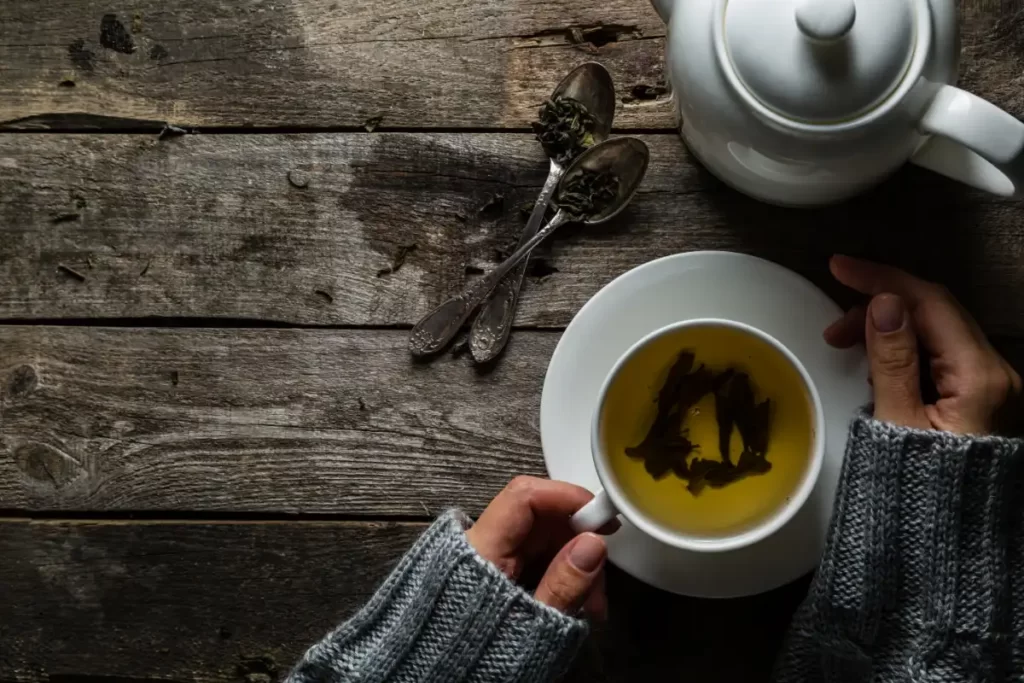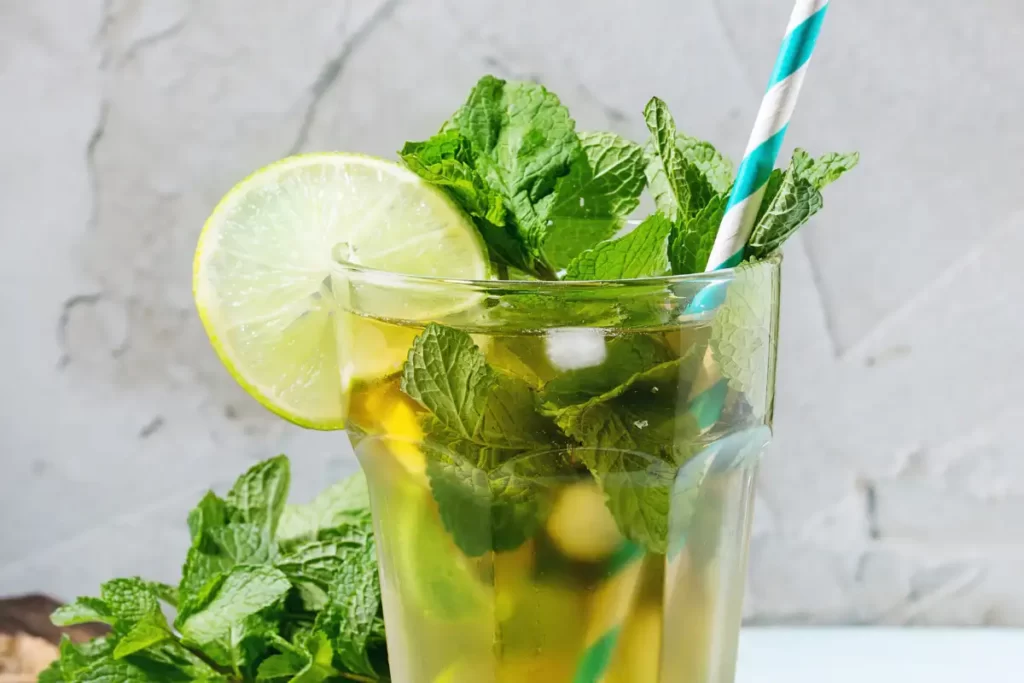Lipton is a well-known tea company that offers a variety of teas in various locations across the world. Lipton green tea is not available in major British supermarkets, although they are available in overseas stores and online in the UK (on Amazon, for example).
Lipton sells a wide range of teas, including black tea, herbal teas, and even Matcha green tea.
When it comes to green tea, they have a variety of green tea bags to choose from, including their Pure Green Tea and flavoured green teas. Some people question if their green tea bags are any good and if they are healthy because the brand isn’t recognised for its green teas.

Given how popular Lipton green tea is (just check internet evaluations), you might believe it’s a good idea to give it a try. Lipton green tea is rather inexpensive, so if you try it and don’t like it, you won’t be out much money, right? Are Lipton green tea packets, on the other hand, truly healthy? Will you find any substances that are questionable? What about the various green teas they have on hand? Let’s take a closer look…
Lipton Green Tea with a flavour
If you don’t like the additional components in your tea, stay away from Lipton’s flavoured green teas.
Ingredients like soy lecithin and modified corn starch can be found in Lipton flavoured green teas. You’ll also discover a variety of natural flavourings and extracts that aid in the creation of a certain flavour. Although these additives aren’t inherently harmful, this sort of green tea will be less powerful and have fewer of the beneficial antioxidants and minerals that green tea is known for.
Lipton Green Tea (Pure)
Lipton Pure Green Tea is a better alternative than Lipton’s flavoured green teas since it is pure and has no other ingredients other than green tea.
When you glance at the package, you’ll notice that Lipton Pure Green Tea is 100 percent natural and contains no additions, preservatives, or colorings.
Isn’t this appealing? Yes, it’s not awful, but green tea is about much more than the fact that it’s free of chemicals and preservatives.
To clarify, you won’t often discover additives or other problematic components in store-bought pure green teas. Green teas are (typically) merely green teas, and when put in airtight packaging, they have a long shelf life. There are no preservatives required.
Lipton Pure Green Tea – Health Benefits
So, what nutrients are included in Lipton’s 100% green tea? Are these components found in other varieties of green teas as well?
In terms of calories, green tea has none, which means it has no carbohydrates, fat, or protein.
According to Lipton’s customer service, this tea includes Vitamins A and C, as well as Calcium and Iron.
In terms of flavonoids, one cup of Lipton’s pure green tea (250ml) has 150mg.
Flavonoids are renowned for their anti-oxidant, anti-inflammatory, and even anti-carcinogenic qualities, which make them helpful to one’s health.
They are beneficial in the prevention of a variety of chronic illnesses, as well as having anti-aging properties by shielding the body from damaging free radicals.
Green teas are high in these potent antioxidants, although the amount found in each variety of green tea varies depending on the tea’s origin, growing circumstances, and other variables.
Origin of Lipton Pure Green Tea
You won’t be able to tell where this green tea originates from just by glancing at the box. To find out, I had to contact their customer service department. Their response is as follows:
In India, Kenya, and Tanzania, we have our own tea farms. At these estates, they run significant research projects to enhance growing and harvesting techniques, ensuring that you get a consistently excellent cup. We also acquire teas from up to 35 different countries to maintain a constant flavour and supply. To satisfy the tea specialists, these teas must be the best of the best.
So, Lipton Pure Green Tea will be a combination of green teas from many nations, rather than a single origin.
Green tea is manufactured from the same sort of leaves as black tea, but leaves are steamed within 24 hours of harvesting to prevent oxidation (fermentation), which gives black tea its flavour and character.
The tea is also Kosher and Rainforest Alliance certified, according to the company.
Material for Lipton green tea bags
To accomplish bag sealing, Lipton green tea bags are produced from a mix of wood pulp, hemp fibre, and synthetic fibres. All of their paper suppliers must verify that they do not bleach with chlorine.
Furthermore, because the tea bags are entirely biodegradable, they should be disposed of with your food waste in your green bin or comparable service if your town has one. Both the tea bag and the tea will be entirely composted if the tea bags are placed in a green bin or comparable.
It’s fantastic to see Lipton contributing to the environment, which means you won’t have to worry about plastic in your Lipton green tea, which is, of course, healthier.
Is Lipton green tea caffeine-free?
Many people ask if Lipton green tea has caffeine, and the truth is that it does. All Lipton Green Teas will contain between 28 and 38 mg of caffeine, according to Lipton. Caffeine content in pure green tea is about 35mg.
Lipton’s other green tea varieties
Green teas such as Sencha (in pyramid tea bags), Matcha, and Jasmine Green Tea are also available from Lipton.
Matcha Green Tea Is Magnificent
Matcha is typically supplied from Japan, while Lipton’s originates from tea farms in India, Kenya, and Tanzania.
Matcha green tea is cultivated in a different way than regular green tea — the chlorophyll-rich leaves of a shade-grown green tea are finely crushed into a bright green powder renowned for its powers.
Lipton Matcha teas will have a caffeine concentration of 25–30mg, and the tea bag material will be the same as regular Lipton green tea bags.
Matcha green tea is believed to have more antioxidants than regular green tea, and as a result, it is thought to be healthier. However, the antioxidant content of tea is heavily influenced by its origin and other variables.
Because this isn’t real Japanese Matcha, the quality isn’t going to be as nice, and the antioxidant content isn’t going to be as high as it would be if you drank original Japanese Matcha the conventional method (consuming whole leaf powder without the use of tea bags).
Of course, this isn’t to say that Magnificent Matcha Green Tea isn’t healthy; it certainly is; it’s just that if you want a true Matcha tea, you’ll have to go elsewhere.
Cold beverages made with Lipton green tea
Some individuals prefer ice tea to hot tea, especially during the summer. Because of this, Lipton also offers Green Ice Tea. However, this is not Lipton’s healthiest green tea.
It contains sugar (which is bad for you! ), flavouring (which isn’t clear whether natural or artificial), and other suspect components.
One thing to keep in mind is that Lipton uses a little quantity of green tea extract in this tea. While this extract does include antioxidants, it’s unclear how much of them are present.
You’re better off drinking pure green tea if you want to get the advantages of green tea. This way, you’ll eliminate sugar and other unnecessary substances that may be harmful to your health.
Is Lipton green tea healthy?
We can confidently state that Lipton’s 100 percent natural pure green tea has certain health advantages since it includes helpful antioxidants that have been shown to benefit human health.
One thing to keep in mind is that this tea is not organic, and while Lipton adheres to high quality and safety standards, this does not guarantee that pesticide residue will not be present in your tea. Lipton, on the other hand, ensures that all government standards are followed, ensuring that this tea is safe to consume.
Tea can also include lead and other contaminants, although this is true of all types of tea.
Lead is a naturally occurring component in soil, and tea plants are well recognised for absorbing it through their roots. In most cases, there is very little lead in tea, and the Food Standards Agency states that the little levels of lead detected in tea are not harmful to consumers’ health.
Lipton selects the locations from where they obtain its green tea with care, ensuring that all quality and safety criteria are satisfied. This might indicate that Lipton green teas have less pollutants than green teas from other brands, but if you want a truly high-quality green tea with the greatest antioxidants, opt for loose leaf green tea (not tea bags) that is preferably organic.
So, how healthy is Lipton green tea?
In conclusion, sure, and it’s ideal for a casual green tea drinker. However, alternative green tea brands should be considered if you want the best green tea.



